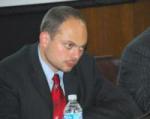Russia’s protests continue to grow — in a major warning to Vladimir Putin

The pro-democracy protests that spilled onto the streets of Moscow for the fourth straight weekend last Saturday broke many stereotypes — both about today’s Russia and about mass movements in general. About 60,000 people— triple the size of the previous large rally in late July — gathered on Sakharov Avenue in the dead heat of August, the month when politics here traditionally takes a break. Demonstrators came despite the absence of prominent opposition leaders, nearly of all whom have been jailed after previous protests. The turnout was dampened neither by the brazen police brutality shown over the past few weeks, when thousands were arrested, nor by the Moscow authorities’ efforts to keep people away through official “storm warnings” and hastily organized music festivals.
The biggest stereotype broken this month, however, was the one still repeated by many Western commentators: that Vladimir Putin is the unchallenged leader of Russia, and that there is no alternative to his rule. “Despite political institutions designed to freeze everything that is alive, life still finds a way,” wrote Dmitri Travin, a prominent Russian political analyst. “If we want to close our eyes on reality, we can continue to moan that ‘There is no one but Putin.’ [But] the post-Putin Russia is being born today — and if we want to see it, we will.”
What first brought Muscovites to the streets was the authorities’ decision to block opposition candidates from September’s election for the city legislature. As so often happens, though, the movement has outgrown its original trigger. The protesters’ grievance with the Kremlin is no longer just about ballot access. They are rejecting a corrupt and outdated political system that denies citizens their voice and their very dignity.
Last week that system marked its 20th anniversary. It was on Aug. 9, 1999, that then-President Boris Yeltsin nominated Putin as his prime minister and heir apparent. Like most of the country’s political elite at the time, Russia’s parliament did not take the news seriously — and confirmed Putin to the post, by 233 votes to 84, without much debate in a swift summer session. Most lawmakers expected Putin to be just another temporary placeholder who would soon be forgotten; history has decided otherwise.
Two decades on, a whole generation of Russians has grown up without knowledge or memory of any other reality — of media freedom, political pluralism or competitive elections. A whole generation has never witnessed a changeover of government. For years, the Kremlin maintained its control through shrewd Machiavellian methods that have given Putin’s regime the reputation of a savvy postmodern dictatorship, with successive electoral “victories” engineered through media manipulation, administrative pressure and skillful mobilization of loyal sectors of the population.
Now this is no longer enough. Every authoritarian regime has its expiry date — and it seems that Putin’s is fast approaching. Recent regional elections in various parts of Russia have shown that voters are looking for any alternative to the ruling group. Even with all their media controls and administrative powers, pro-government candidates were headed for a humiliating defeat in the Moscow election — and the authorities chose the only tool they considered safe by disqualifying opposition candidates. It’s not difficult to win an election when your opponents are not on the ballot.
Like so many authoritarian regimes have in the past, the Kremlin is disregarding a fundamental historical maxim: When power cannot be changed at the ballot box, it will, sooner or later, be changed on the streets. We are not at that moment yet — and the Putin regime still has a formidable resource in its security services, which over the weekend gave Moscow the look and feel of a city under military occupation. Prosecutors are now busy concocting a new criminal case against protesters; 14 peoplehave been charged with participating in “mass disturbances.” Predictably, Kremlin officials are blaming the protests on Western governments and nongovernmental organizations. In the short term, the number of political prisoners in Russia is likely to grow substantially.
In the longer term, however, the outcome of this standoff is known. No amount of state-driven coercion can, in the end, stop a strong enough public sentiment. If one needs proof, it can be found in the last time a major political crisis interfered with Russia’s traditional August break. On Aug. 19, 1991, Muscovites woke up to the sounds of “Swan Lake” on their televisions and the sight of tanks on their streets, as top government leaders decided to put an end to experiments with glasnost and reassert political control.
But as hundreds of thousands took to the streets to confront the repressive system, its ostensible strength collapsed within days. As Yeltsin said at that earlier and much nobler moment of his presidency, “You can make a throne of bayonets — but you can’t sit on it for long.”
























